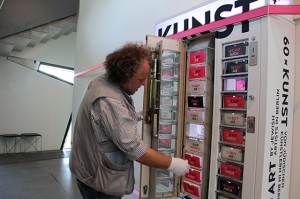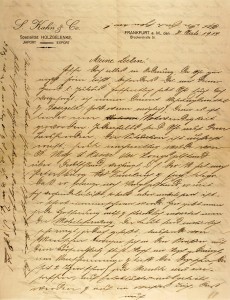When I first heard that the Jewish congregation of Pinneberg is giving “church asylum” to a Muslim, I had to chuckle. The article about it in the online magazine Migazin put the words “church asylum” in quotation marks and used a picture of the dome of the synagogue on Berlin’s Oranienburger Straße – making the linking together of the three monotheistic religions appear intentional.
But now I heard from a friend that there’s a film about the Kiddush asylum at the Pinneberg congregation for a man from the Sudan, and I had to wonder why “church asylum” isn’t “synagogue asylum”.
The Kiddush is a blessing spoken over a goblet of wine at the beginning of a holy day, in order to sanctify the day. Church asylum, as I learned from the film, is actually about a sacred room that protects people who are under threat. The Jewish congregation in Pinneberg has one such room. And it is encouraging to hear – as the head of the congregation explains in the film – why they are using this space to protect a person, at least temporarily, from persecution.
Rosa Fava, director of the “Diversity in Schools” project
Handmade, for our Art Vending Machine

Jens Eisenberg (company Leitwerk) fills our art vending machine.
© Jewish Museum Berlin, photo: Gelia Eisert
Anyone who walks through the first floor of our permanent exhibition has inevitably stumbled across our ‘art vending machine.’ The machine almost seems to be whispering, in two languages, “Kauf mich, buy me.” Labels gleam colorfully from the compartments but you won’t notice more than that at first. If you get curious, though, and come closer, you will read the inscription, “Kunst / Art” in big typeface, and along the vending machine’s side, “60 x art by Jewish artists in Berlin.” Now you notice the coin slots, where you can put in your 4 euros.
With the right change in your pocket and a little audacity, you can start the experiment. → continue reading
A Letter from the Archive Tells of the Outbreak of War in 1914

Letter from Leo Roos to his family (first page), Frankfurt am Main, 31 July1914
Donated by Walter Roos
© Jewish Museum Berlin
“The situation is extremely serious; His Majesty the Emperor declared this afternoon that Germany is now at war.” Exactly one hundred years ago today, eighteen-year-old Leo Roos penned these lines to his parents and siblings back home in the West Palatine village of Brücken. But they were never to receive his letter, as the note on the envelope attests: Dispatch prohibited on account of the state of war. Return to sender.
Roos felt he was witnessing fateful times. He lived in Frankfurt, where he was apprenticed to a bank. He thought himself a city boy, much closer to momentous global events than his family was, off in its isolated village. He described the tense mood: → continue reading

